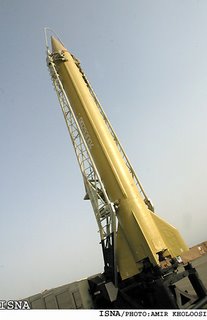
The Power Of Tehran's Defence
****************************************
Courtesy Of: GulfNews.com
BY Patrick Seale
Iran is a formidable military power, second only to Israel in the Middle East, this is the Judgement of most Western observers.
Unlike Israel, however, it has been denied access to American weapons, and indeed to most Western weapons, since the overthrow of the Shah by the Islamic Revolution 27 years ago.
And, again unlike Israel, Iran has no nuclear bombs at least not yet. nevertheless, militarily, it is by no means backward or defenceless.
Largely through its own immense efforts and with some help from Russia, China, Pakistan and North Korea, Iran has created a powerful military-industrial complex, which employs more than 200,000 engineers, technicians and skilled workers.
According to the London-based International Institute of Strategic Studies (IISS), Iran today produces almost 2,000 defence items, from munitions to aircraft, and from missile boats to satellites. It exports military equipment to over 30 countries, including seven in Europe.
How would it fare if it were attacked by the US alone or indeed by the US and Israel together. Could it defend itself? could it strike back? To what extent has it acquired a capability for strategic deterrence?
RELEVANT QUESTIONS
--------------------------------------
The questions are relevant because, although there are now some slender hopes that the crisis over Iran's nuclear programme might be resolved by negotiation, the possibility of war cannot be ruled out.
There is undoubtedly a strong current of opinion in both the United States and Israel that, for geopolitical reasons, would prefer the Islamic regime in Tehran to be destroyed, much as Saddam Hussain's regime in Iraq was destroyed.
Geopolitical ambitions are, in fact, fueling the dispute over Iran's nuclear activities. The US is concerned to control Middle East oil for at least the next decade or two.
Israel, in turn now that Iraq has been smashed wants to consolidate its military dominance over the region, and be in a position to reshape the regional order to suit its interests. To both powers, therefore, Iran poses a strategic challenge.
Iran is determined to pursue its nuclear programme for what it claims is the purely peaceful purpose of producing fuel for nuclear power stations. Both the US and Israel have, on several occasions, stressed that they would not allow Iran to acquire nuclear weapons.
In pressing for the use of force to put an end to Iran's nuclear ambitions, Israel betrays its fear that the US might strike a deal with Iran which would undermine Israel's strategic predominance, as well as its privileged status as America's key Middle East ally.
In the Military Balance 2006, the IISS's annual analysis of the world's armed services, Iran's capability is described in some detail.
The IISS conclusion is that the years of war with Iraq "turned the Iranians into military professionals" who proceeded to develop an advanced and innovative defence industry. They were able to create an industrial infrastructure which is capable of meeting nearly every requirement of the Iranian Armed Forces.
What has been the purpose of this vast Iranian effort? Is it for offensive use or is it purely defensive? Should the Arab Gulf States be concerned at Iran's military power?
The IISS believes that Iran's defence structure is based on a foundation of "strategic deterrent defence."
STRATEGY
------------------
Iran's strategy, it says, "is to absorb a first strike and then to initiate immediate retaliation with all means available, but only if such a move serves the political ends and does not threaten the very existence of the Islamic regime."
What does this mean in the current situation?
- First, it suggests that Iran will not be bullied into abandoning its nuclear activities.
- Secondly, Iran's considerable military strength is for deterrence purposes, to protect it against an aggression by the US or Israel aimed at regime change.
- Thirdly, if Iran is seeking to build an atomic bomb which it strenuously denies, this could only be to strengthen its deterrent posture. It could not consider using such a weapon without risking national annihilation at the hands of the US and Israel.
Nuclear weapons have contributed to stability between the West and te former Soviet Union, and between India and Pakistan. Might they not serve a similar function between Iran and Israel?
Would an Iranian bomb really be such a disaster?
History has surely proved that a balance of power creates peace, whereas imbalance causes war, as the more powerful side will inevitably seek to impose its will by force.
Is not this the meaning of the current threats against Iran by the US and Israel?
Source:
http://gulfnews.com/opinion/columns/region/10047206.html




No comments:
Post a Comment